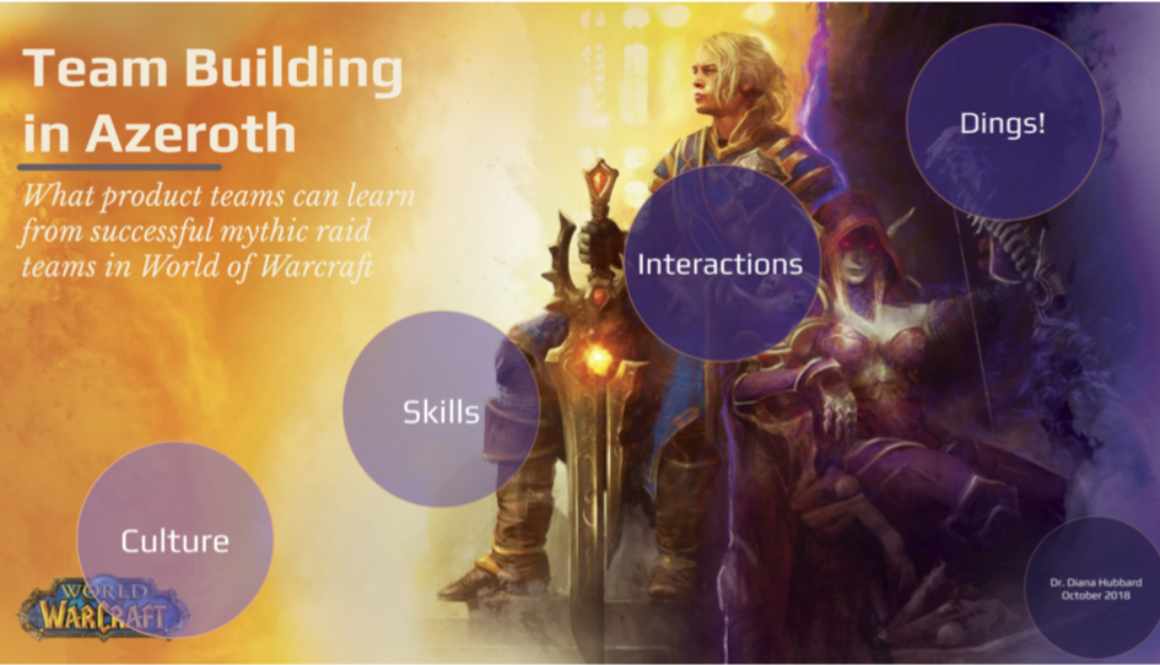Team Building in Azeroth
This presentation was originally given at DFW Beyond 2018 (October). I was the last of the speakers on the main stage for the morning (meaning: there were a lot of people in the crowd!). I’m going to add my script here as I originally wrote it along with the screen shots from the Prezi presentation. If you want to see the original presentation as it was presented, you can find it here.
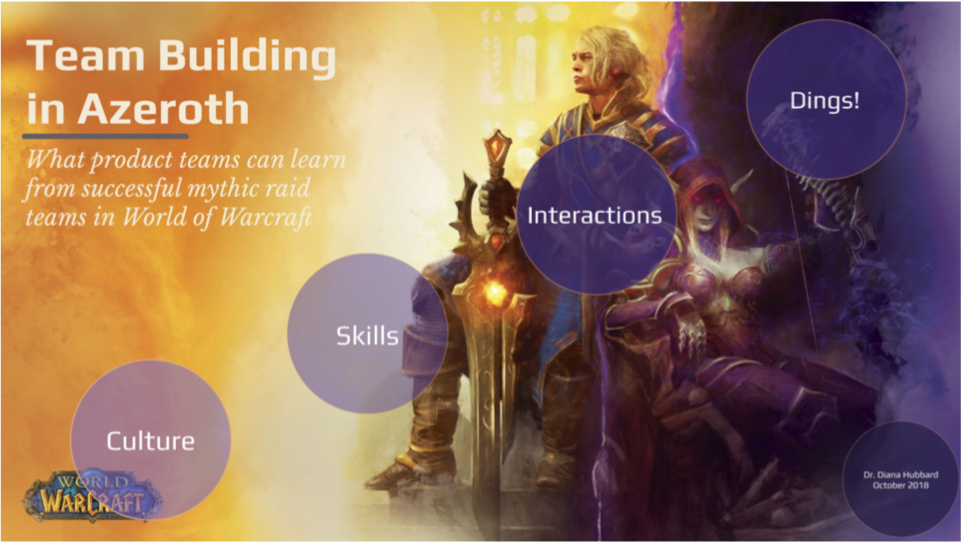
Intro
Hello everyone! We’ve heard a lot of great talks this morning and now all that’s standing between you and lunch is me! It’s like an epic boss fight. If you survive this then you’ll be on your way to victory. So, with that, let’s take a left turn here and have a little fun.
Gaming Team
Anyone here play video games? Anyone here play video games with other people? How about large groups of people?
Work Team
Now let’s think about the people you work with.
How many of you work with 4 other people? 9 other people? 19 other people? How many of you work with 19 other people for an intense non-stop three to four hours at a time multiple times a week? Could you do that? Would do you do you that?
What kind of skills do you think would be required to be able to do that calmly, collectively, and collaboratively even in the face of failure after failure after failure until you finally succeed?
Do you think we can learn from groups who are able to do this and do it successfully and do so repeatedly on purpose? I am here because yes, I think we can.
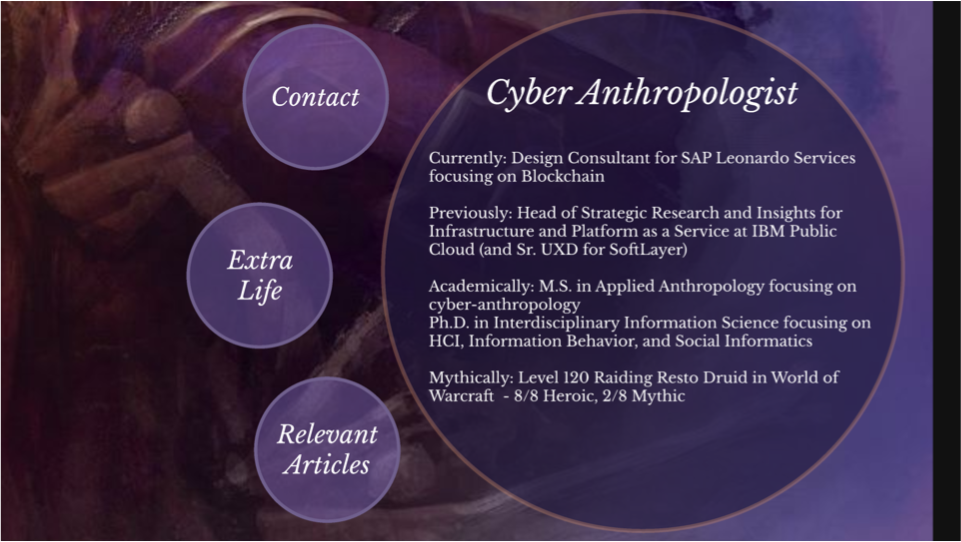
Who am I
My name is Dr. Diana Hubbard. I am currently a design consultant for SAP specializing in Blockchain (I’m now a Director of Research for Hilton). In my previous role, I was the head of strategic research and insights for IBM Public Cloud. You can also tell I’m also an academic by the length of my title and my strategically placed colon.
For the past 11 years, I have had the opportunity to pull together successful research, design, and development teams in multiple organizations ranging from Software as a Service to Infrastructure and Cloud Services to now with Edge Technologies.
I contribute the success of these teams to lessons learned from World of Warcraft.
Academically I am an anthropologist and information scientist who has studied gamers, gaming, developers, and open source development communities for the last 12 years.
Druid
I am also a max level Resto Druid (I main a horde druid these days) in a newly built high-end raiding guild (I’ve changed guilds since then) in World of Warcraft.
Though I’ve played for the last 14 years and been a part of many raid teams, this one was put together specifically for the expansion that just came out in August.
I raid with up to 19 other people 3 to 4 nights a week for 3 to 4 hours at a time. This is on top of my job and taking care of my family of 5 including 3 children, as well as our 3 dogs, and our home.
Learning
Today I am going to highlight a few things I think people like us, who build and manage teams, can take away from these organically grown communities of practice who come together both inside and outside the game to voluntarily put in a lot of time and effort to successfully collaborate in highly intense situations toward a common goal.
And they do this in the face of failure and defeat and the possibility of getting nothing but a virtual repair bill for their hard earned broken digital armor.
Since my time is so short (I only had 20 minutes) I will only be able to go into these at a high level but I will provide a link at the end of to my blog where I will talk about it in detail and link to this presentation. (<– this is just now happening)
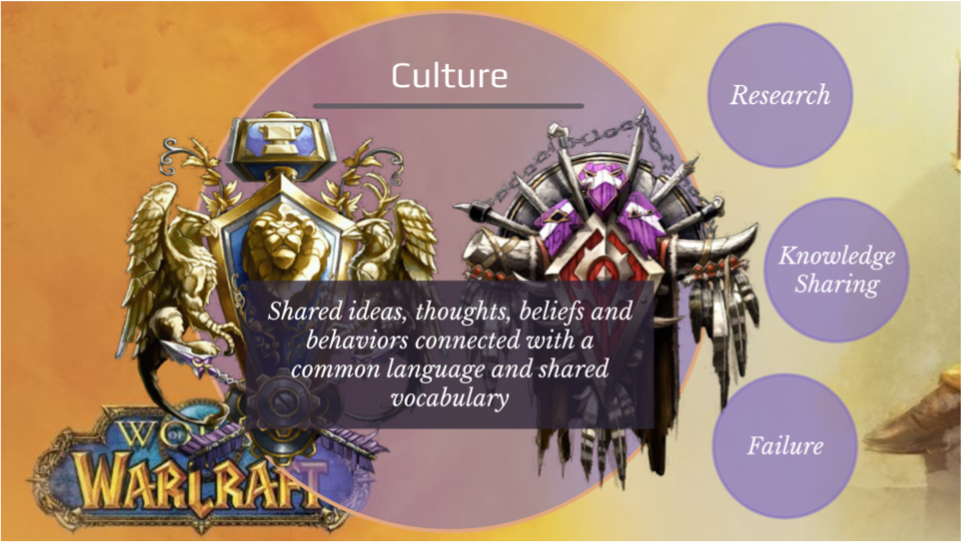
Culture
Let’s start with Culture.
What is culture anyway. Is it where we live? What we do? The clothes we wear?
As an anthropologist, especially one who studies geographically dispersed online communities, I obviously have an opinion on this. I define it as shared ideas, thoughts, beliefs, and behaviors with a common language and shared vocabulary.
This is an important distinction because raid teams do not normally all hail from the same countries or even speak the same first language, but they all know, understand, and have a passion for Warcraft. The same can be said for many of our product teams in relation to our businesses.
Being a cultural anthropologist, it is no surprise I have found culture to be an essential element of successful teams. There are many ways it is important, but for the purposes of this talk I’ve distilled it down to 3. Culture of Research, of Knowledge Sharing, and of Failure.
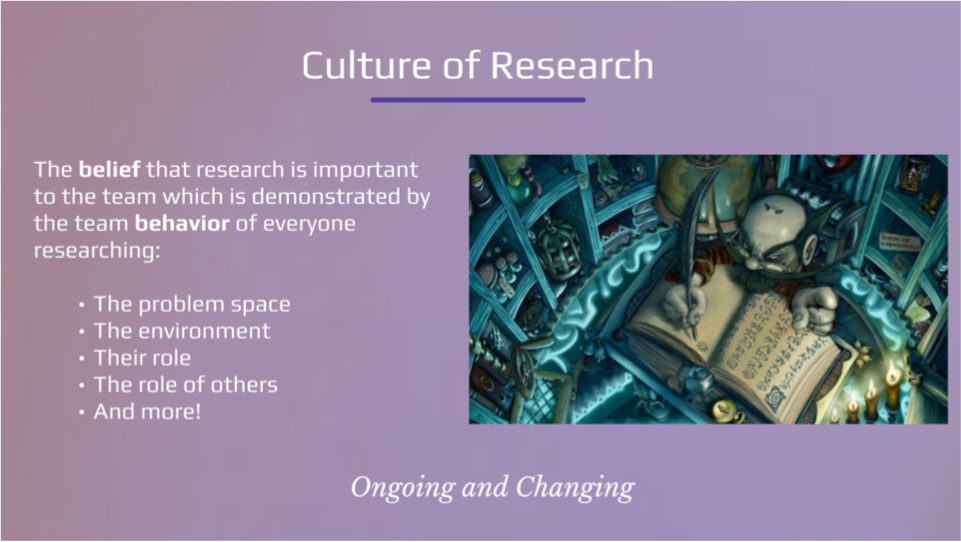
Research
Considering research, the most essential part is that everyone does it. And this isn’t necessarily user research activities, though as a UXR I do highly recommend all members of product teams participate in at least some user research activities.
In this case, research is a bit more high level including topics such as the problem space. Everyone conducting some sort of research at this level not only helps individual knowledge, but it also improves the overall interaction of the team as it helps level the playing field and gets everyone on the same page.
The purpose is not necessarily to get all of the answers, but to know what questions to ask. Lastly, it should be noted that research never stops. The game is always changing, as projects do, so research is always ongoing and evolving which is why knowledge sharing is important.
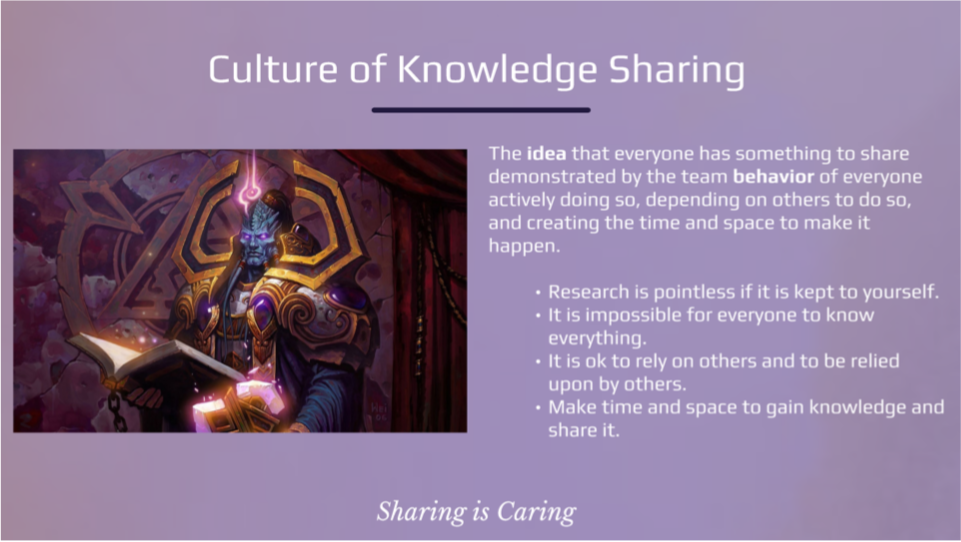
Knowledge Sharing
Knowledge sharing is fundamental to the progress of the team because not everyone can know everything at all times. I don’t know if you’ve ever seen a mythic raid boss fight, so imagine your favorite sports game and add earth quakes, volcanos, lava, tornados, hurricanes, and tidal waves all happening while your team is trying to score a goal and that might give you some idea of how much is going on any one time that everyone needs to have some knowledge of.
Though knowledge sharing may seem like a small thing, it creates an environment where team members come to rely upon each other and learn how to be relied upon, which is important when it comes to progress through failure – something that is a given for a mythic raid team.
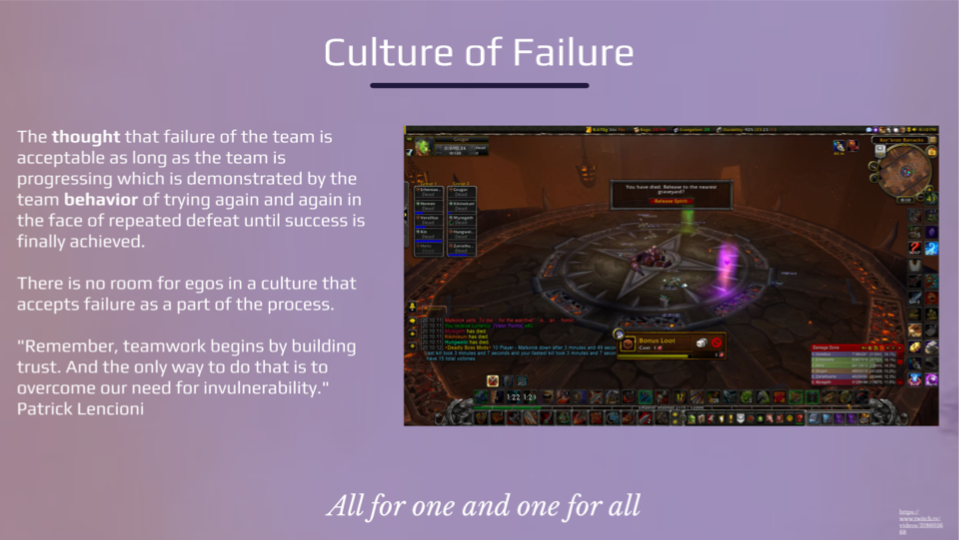
Failure
It is nearly impossible for a team to walk into an encounter or a problem space for the first time and be successful.
We should all know this going in as it’s what we signed up for. Those with egos do not make it very far in mythic raiding because you have to be ok with giving up your invulnerability. You have to be willing to fail with the team if you’re going to ever succeed with them.
There have been nights where we have died an upwards of 30 times, half of them trying to get past a single boss.
However, every time we died we got a little further and learned a little more and all those little failures are what helped us succeed in the end. The important part was we kept going and kept each other’s spirits up as we did, which is a very important skill to have.
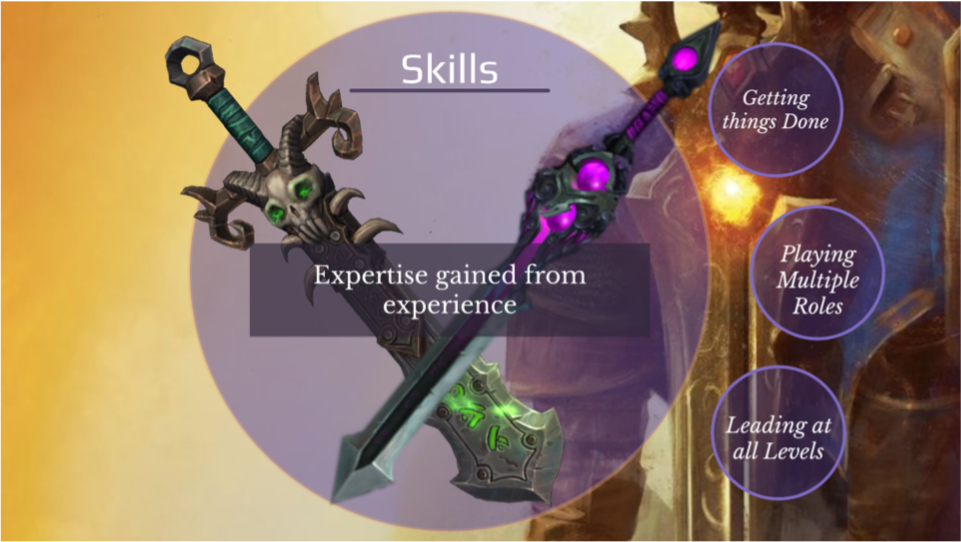
Skills
Skills can mean many things, but for this talk I’m going to keep it simple. I love the straightforwardness of this definition – expertise gained from experience. It plays very well into the three skills I consider essential for raid and product teams, which are getting things done, playing multiple roles, and leading at all levels.
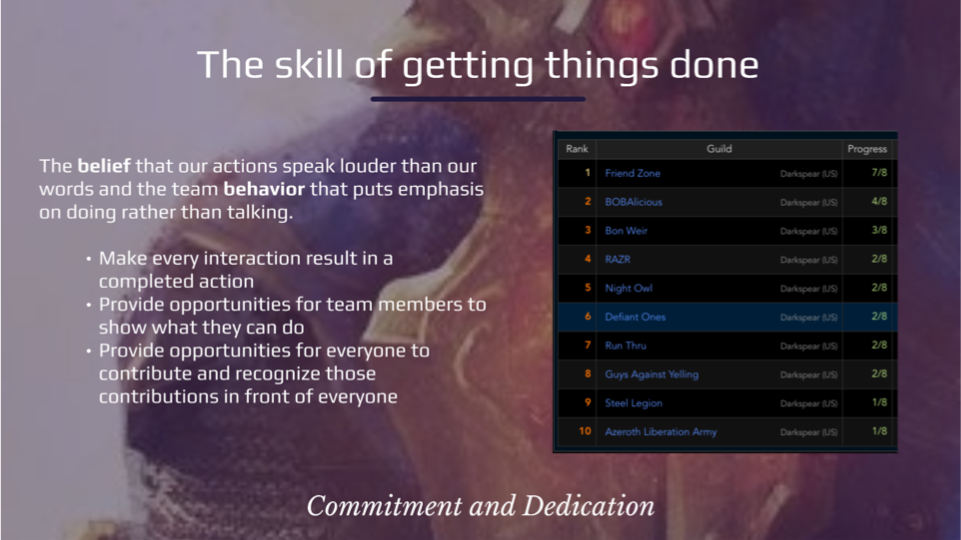
GTD
We’ve all heard of GTD or getting things done, but how many of us practice it? How many of us have meetings about meetings or walk out of a meeting having accomplished absolutely nothing?
For a raid team, time is precious. Not only does our chance to progress reset every week, but we all also have lives and jobs and even children fighting for our time and attention. So, when we meet in game it is always with a purpose and a goal and a timeline.
We all want to see our guild name move up the rankings and we all know we have the power to make that happen but it takes commitment and dedication. We will progress only if we show up together and get things done. And to get things done we sometimes have to step into someone else’s role.
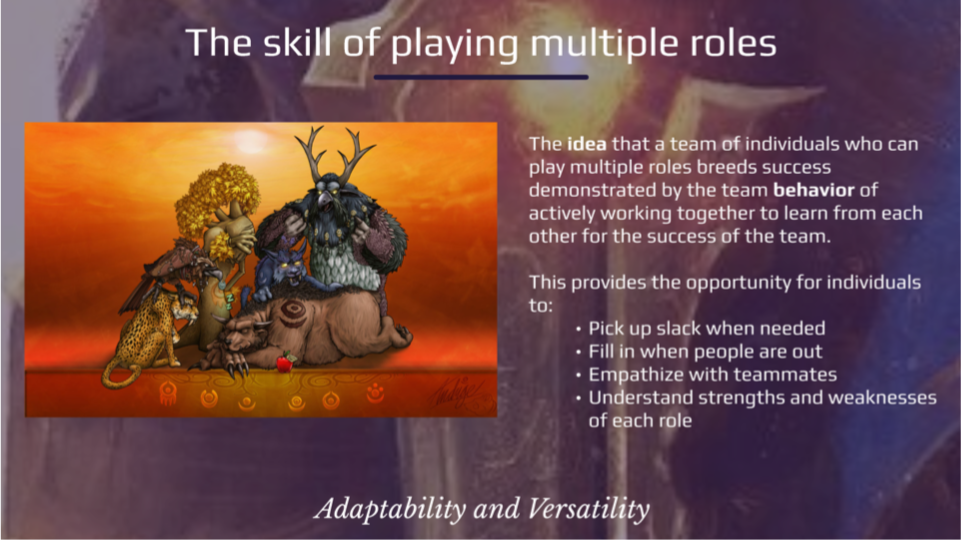
MultiRoles
Having people play multiple roles is not the same thing has having a team of unicorns. Rather, it is about having a team of people who can pick up the slack when someone is sick or on vacation or the deadline has just been moved up.
It’s about team members who have empathy for each other and understand each other’s strengths and weaknesses. Building a team of people who have both breadth and depth creates an environment that is both adaptable and versatile making it an exceptional place for leaders to grow.
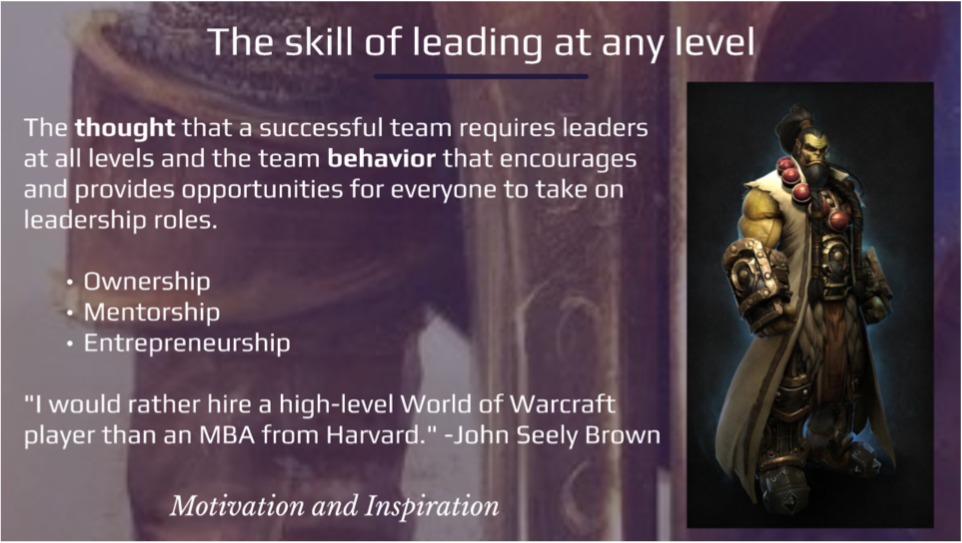
Leaders
Leaders who strive for adaptability and versatility need other people who are willing to take on leadership positions within their teams in order to lead successfully. This is more than delegation. It is about creating a supporting atmosphere for team members to own their contributions and to mentor others.
It’s about creating a space where they feel empowered enough to do new things and take risks to improve the team’s chances for success. Encouraging leadership at all levels provides ample opportunities for motivational and inspirational interactions.
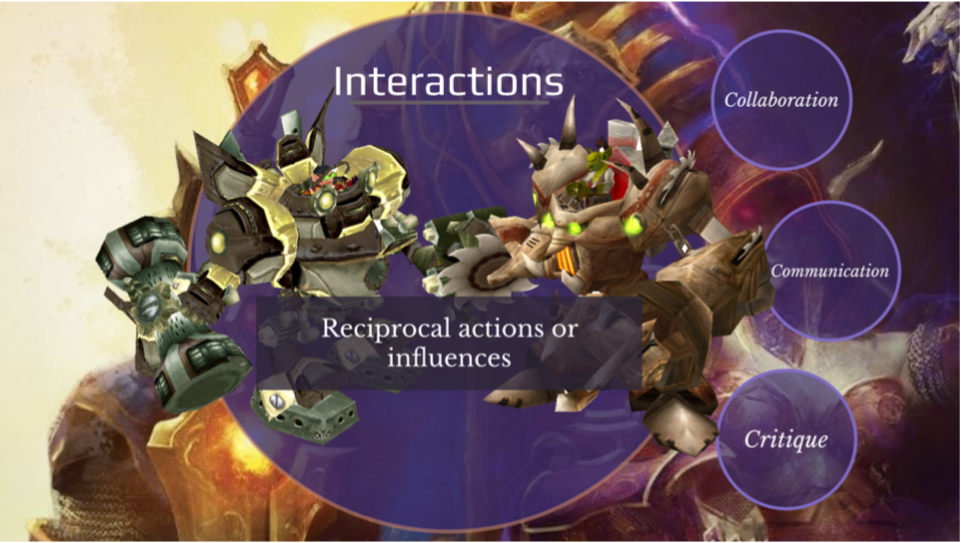
Interactions
Interactions are simply reciprocal actions or influences. It’s the reciprocity that makes a difference for collaboration, communication, and critique.
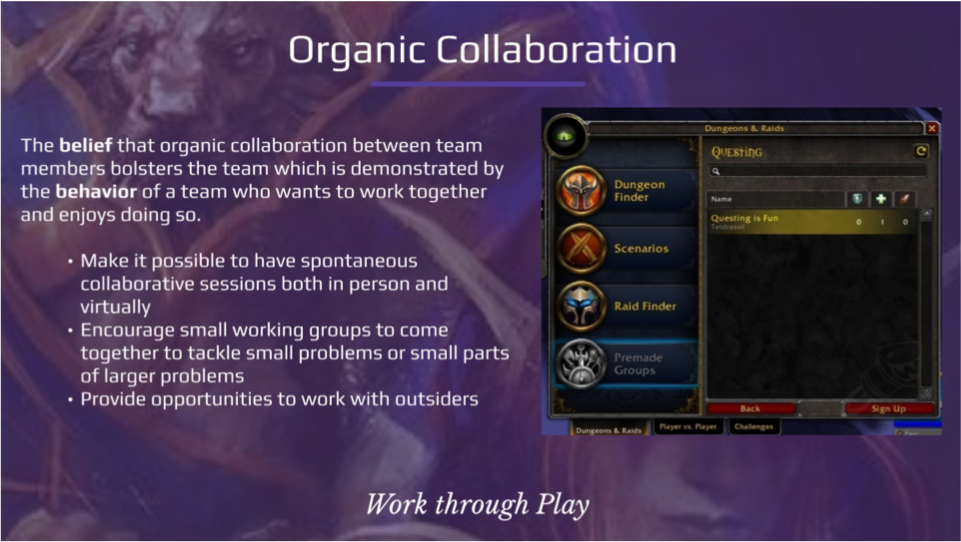
Collaboration
Organic collaboration may seem a bit strange, but we’ve all had those scheduled collaborative sessions that weren’t really collaborative at all.
The idea here is that people get better at what they do and they produce better work when they are able to spontaneously collaborate as needed, work together in smaller groups on smaller problems, and work with people outside of their team for additional or missing expertise.
In WoW we call this pugging or creating a Pick up Group. Doing these things increases team relationships both internally and externally, which improves the success of the team overall especially in communication.
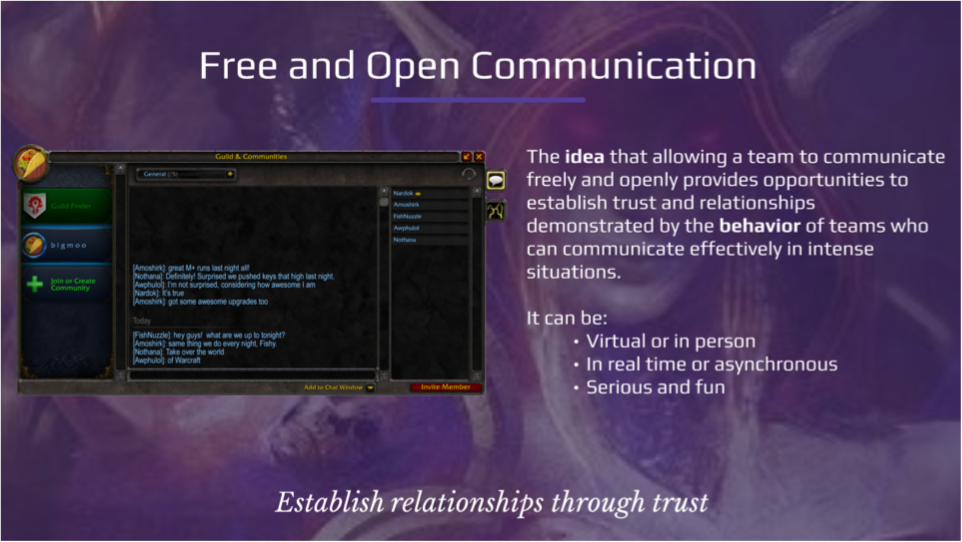
Communication
Free and open communication is essential to the success of every team because it helps build relationships through trust which is needed when the situation gets intense.
The key here is to establish a method of communication everyone can participate in and to make sure it is kept active and relevant. That said, though we may want to try to keep everything on topic, I always recommend a time and place for off-topic chatter because people matter and this is where you really learn what matters to them.
And knowing people is really important when it comes to critiques.
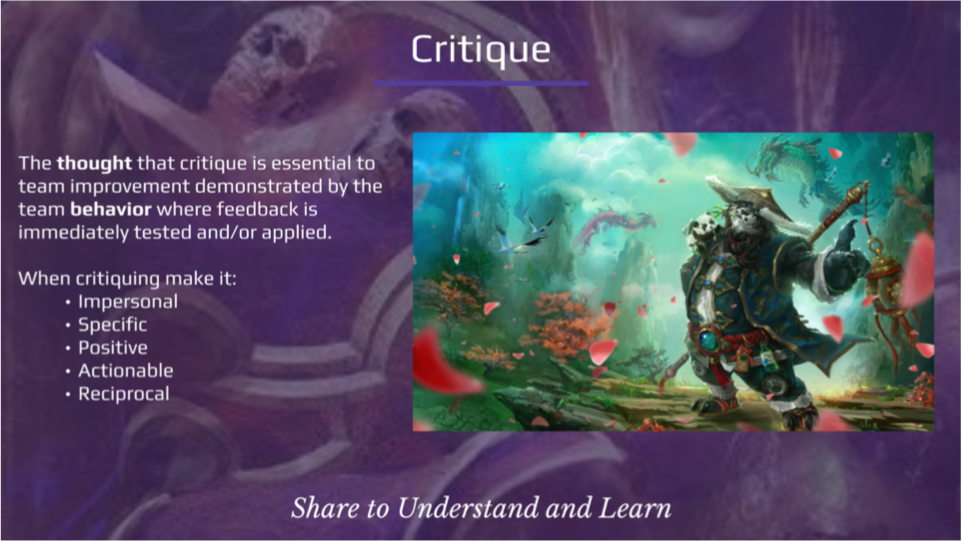
Critique
Critiquing can be difficult to do well and even more difficult to take, but when it is simply a part of the team’s regular interactions it becomes normalized and accepted and even sought after. Giving and accepting critiques is only the first step.
The step that really counts is immediately testing or applying the feedback. This should be done even if the feedback seems silly or counter intuitive because if nothing else it gives you a different way of looking at your problem, which may be what you need to make a difference and that may be all it takes to get a ding.
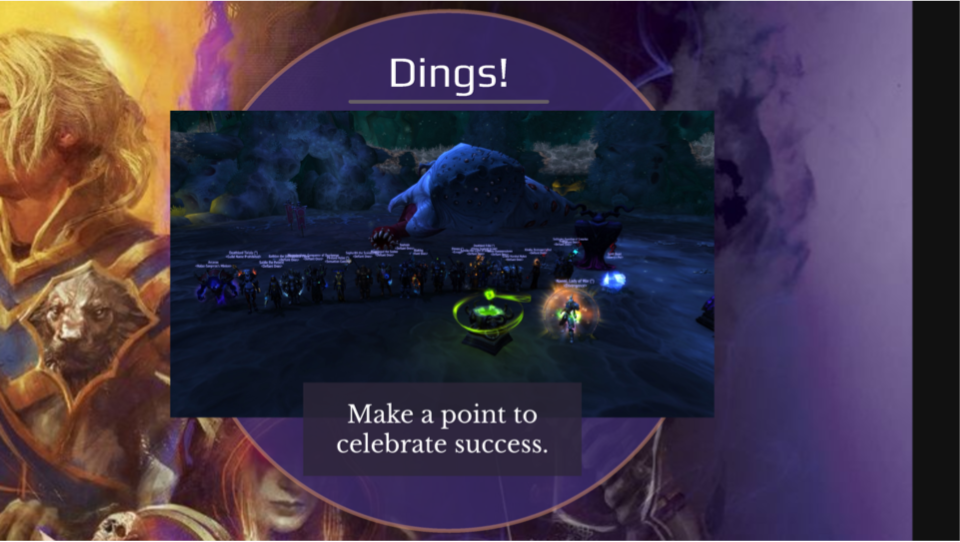
Dings
What’s a ding? Traditionally a ding is what players in WoW would refer to when they completed a character level. I’ve taken it a step further to use it as a way to celebrate progress. Many of us have likely been on teams working on a project that seems like it never ends, much like an MMO. Dings are useful break up the monotony and to keep people motivated as they mark movement forward. So, I recommend building in dings to give something to look forward to and to look back on.
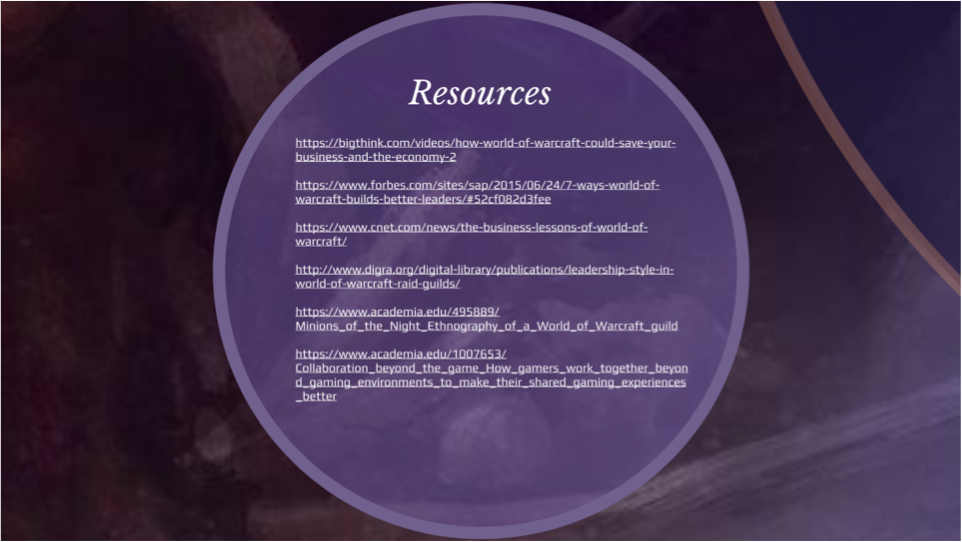
Resources:
https://bigthink.com/videos/how-world-of-warcraft-could-save-your-business-and-the-economy-2
https://www.forbes.com/sites/sap/2015/06/24/7-ways-world-of-warcraft-builds-better-leaders/#6773055e3fee
https://www.cnet.com/news/the-business-lessons-of-world-of-warcraft/
http://www.digra.org/wp-content/uploads/digital-library/10343.52340.pdf
https://www.academia.edu/495889/Minions_of_the_Night_Ethnography_of_a_World_of_Warcraft_guild
https://www.academia.edu/1007653/Collaboration_beyond_the_game_How_gamers_work_together_beyond_gaming_environments_to_make_their_shared_gaming_experiences_better
(The last two links are my papers.)
Note: All images are owned by their owners including Blizzard Activision and are used here in Fair Use for scholarly purposes. This talk was given pro-bono and this information is being shared for free. You can find a portfolio of all of the slides here.
